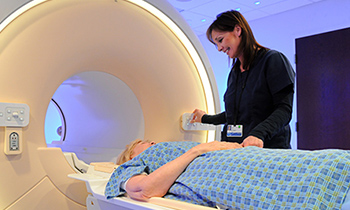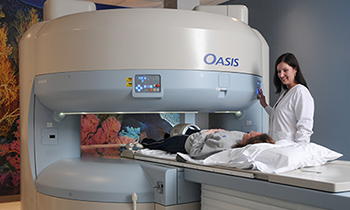MRI
Magnetic resonance imaging provides detailed views inside the body for accurate testing and diagnosis.
Magnetic resonance imaging, or MRI, exams help our doctors diagnose many conditions. MRIs are safe and effective, and they give us valuable information that may not show up in a physical exam.
What is an MRI?
MRI uses magnets and radio waves to create pictures of the inside of the body. We use MRI to examine many different parts of the body, such as:
- Muscles
- Nerves
- Organs
- Tendons
MRI scans we offer
We perform different types of MRI exams depending on patients’ specific conditions. We may need to give you an injection of contrast material for clearer images during your test, or we may perform the test without contrast material. If you are receiving an injection of contrast material, you may view the FDA Medication Guide for Dotarem.
Some of the MRI scans we offer include:
- Breast MRI
- Magnetic resonance angiography (MRA), which creates images of blood vessels
- MRA of the brain
- MRI of the abdomen
- MRI urogram, which we use to examine the abdomen, bladder, kidneys, pelvis, and ureters (tubes that carry urine from the kidney to the bladder)
- Prostate MRI, which we use to help diagnose conditions such as prostate cancer and benign prostatic hyperplasia
- MRI of the heart, which we use to diagnose various heart conditions
- MRI enterogram, which produces pictures of the small and large intestines so we can diagnose various gastrointestinal disorders and inflammatory bowel diseases
MRI scans at Henry Ford
All of our imaging technologists are certified by the American Registry of Radiologic Technologists, and our facilities have achieved accreditation by the American College of Radiology. We also offer convenient MRI hours at our different locations to fit your schedule.
We’ll answer all your questions before, during, and after the exam. In the meantime, we have answers below to some of the most commonly asked questions about MRI exams.
| Standard Bore | Wide Bore | Open |
|---|---|---|
 |
Not Pictured |  |
| 60 cm diameter | The wide bore units are the same as the Standard Bore, but with a wider bore diameter of 70 cm | Available only at Henry Ford Allegiance Orthopedic Neuroscience Center |
Patients who experience claustrophobia, have an inability to fit within the Standard Bore scanner, or have physical disabilities that the Standard Bore may not accommodate may want to have their scan completed on the Wide Bore or Open MRI scanners. Please talk with your doctor if you have one of the above conditions and need an MRI.
What can I expect during my MRI scan?
Your test will take 45 minutes to an hour. You’ll lie on a padded table that will move into the center of the MRI scanner. You may feel warmth in the scanned area during the exam.
Your MRI technologist will offer you earplugs to reduce the noise during the exam. An MRI scan can be loud, and you’ll hear hammering or buzzing noises while the scanner takes its pictures. You may feel vibration during these noises, along with slight movement of the table. It’s important to lie still during the test so the pictures the MRI scanner takes aren’t blurry.
You’ll be able to talk to your MRI technologist during the exam with a two-way intercom system. The technologist will keep you updated and check on you between scans.
Are MRIs safe?
Some patients with certain medical conditions or implanted devices (such as most pacemakers) can’t have an MRI. Talk to your doctor or MRI technologist if you’re not sure whether you should have an MRI.
How do I prepare for my MRI scan?
We do not allow jewelry (except for wedding rings), watches, hair pins, magnetic lashes or other personal belongings in the MRI scan room because of the powerful magnets in the MRI scanner. Make sure to leave these items at home. If you forget, you can place them in a locker we provide before your test. If you’ve been admitted to the hospital and need an MRI scan, you should leave jewelry and watches locked in your room.
.svg?iar=0&hash=F6049510E33E4E6D8196C26CCC0A64A4)

/hfh-logo-main--white.svg?iar=0&hash=ED491CBFADFB7670FAE94559C98D7798)